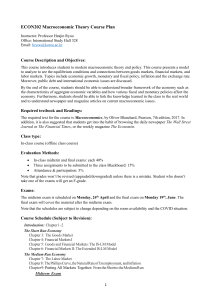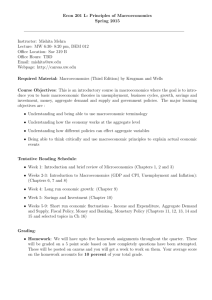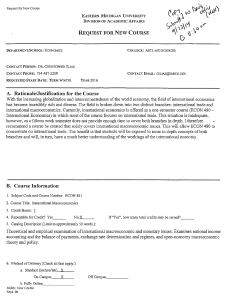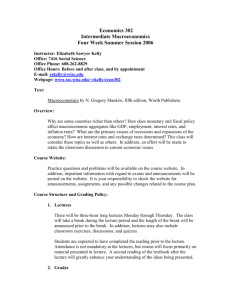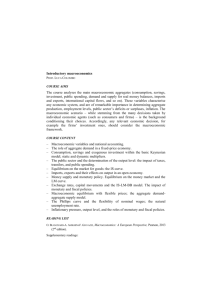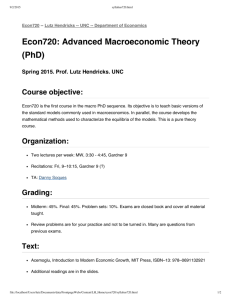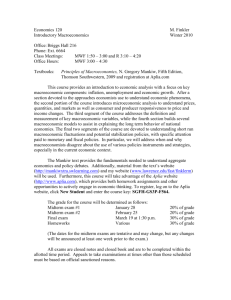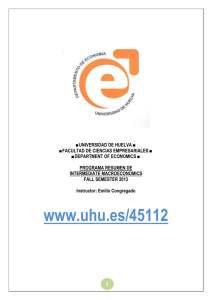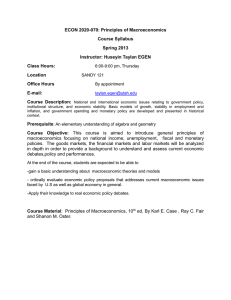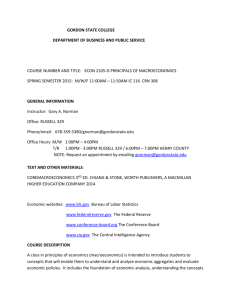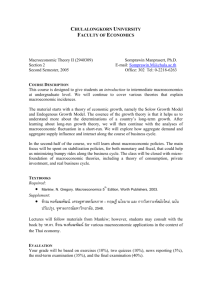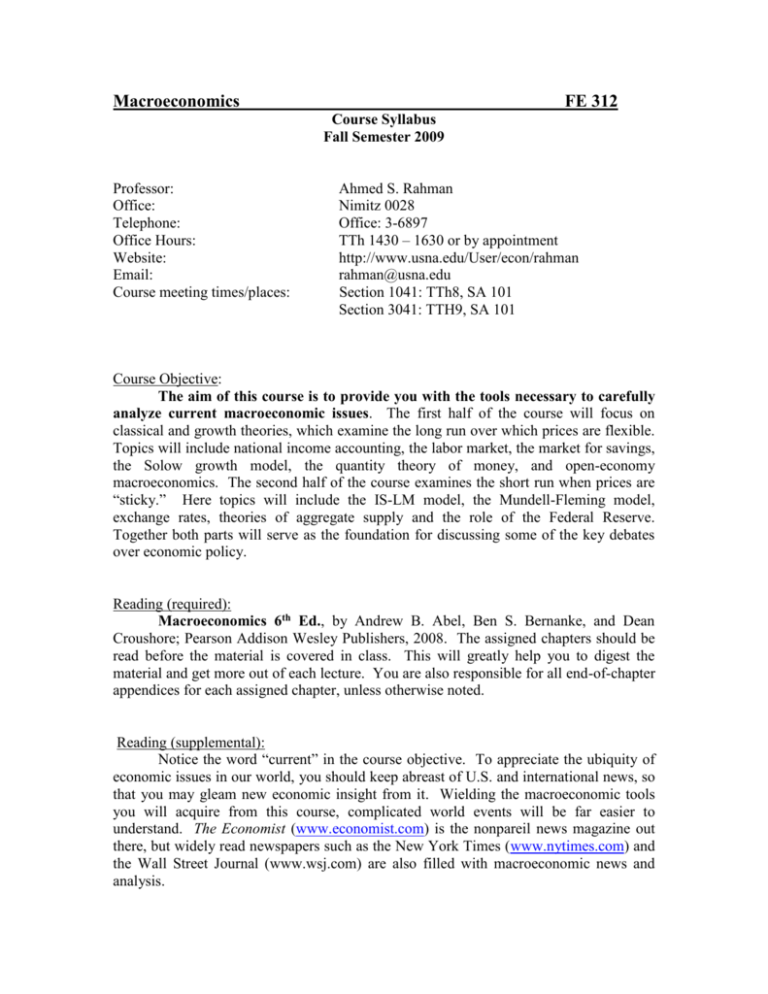
Macroeconomics
FE 312
Course Syllabus
Fall Semester 2009
Professor:
Office:
Telephone:
Office Hours:
Website:
Email:
Course meeting times/places:
Ahmed S. Rahman
Nimitz 0028
Office: 3-6897
TTh 1430 – 1630 or by appointment
http://www.usna.edu/User/econ/rahman
rahman@usna.edu
Section 1041: TTh8, SA 101
Section 3041: TTH9, SA 101
Course Objective:
The aim of this course is to provide you with the tools necessary to carefully
analyze current macroeconomic issues. The first half of the course will focus on
classical and growth theories, which examine the long run over which prices are flexible.
Topics will include national income accounting, the labor market, the market for savings,
the Solow growth model, the quantity theory of money, and open-economy
macroeconomics. The second half of the course examines the short run when prices are
“sticky.” Here topics will include the IS-LM model, the Mundell-Fleming model,
exchange rates, theories of aggregate supply and the role of the Federal Reserve.
Together both parts will serve as the foundation for discussing some of the key debates
over economic policy.
Reading (required):
Macroeconomics 6th Ed., by Andrew B. Abel, Ben S. Bernanke, and Dean
Croushore; Pearson Addison Wesley Publishers, 2008. The assigned chapters should be
read before the material is covered in class. This will greatly help you to digest the
material and get more out of each lecture. You are also responsible for all end-of-chapter
appendices for each assigned chapter, unless otherwise noted.
Reading (supplemental):
Notice the word “current” in the course objective. To appreciate the ubiquity of
economic issues in our world, you should keep abreast of U.S. and international news, so
that you may gleam new economic insight from it. Wielding the macroeconomic tools
you will acquire from this course, complicated world events will be far easier to
understand. The Economist (www.economist.com) is the nonpareil news magazine out
there, but widely read newspapers such as the New York Times (www.nytimes.com) and
the Wall Street Journal (www.wsj.com) are also filled with macroeconomic news and
analysis.
Course work:
Exams: There will be three exams—two midterms and a final. These will test
your comprehension of the material covered in the class notes and the textbook. The final
exam will be comprehensive, covering the entire semester. Exams will consist of multipart questions that will require you to work out problems and respond in short answer to
essay questions. Any midshipmen missing scheduled exams without prior approval from
me will receive a grade of zero on the exam. If you know you are going to miss an exam
(for an officially sanctioned reason), TELL ME AT LEAST TWO WEEKS BEFORE the
date of the exam. Let me repeat - failure to give two weeks advanced notice will result in
a zero for your exam grade – there will be no makeup exams offered.
Problem Sets: There will be weekly problem sets, consisting of a combination of
problem solving, short answer, and data analysis. I encourage you to work together on
these; however, come due date I will not collect your work. Instead, we will have weekly
quizzes, where I will ask one question (often verbatim) from the problem set – these
quizzes will be closed-book, closed-notes, closed-mouth. So, it is in your best interest
not simply to finish each assignment, but to truly understand each assignment ahead of
time.
If you miss class on the day a quiz is given, you will have until the next 2 class
meetings to make it up. Upon your return, you will answer a (probably different)
question from the same problem set, and you will do this at the start of class. I will post
answer keys for all the problem sets roughly one week after they are due. You should use
these as study aids, particularly since the format of the midterms and final exam will be
modeled after these exercises.
The point to stress here is that this is not a class you can pass simply by studying
2 days before each big exam. Of course all your instructors probably say that. You are
certainly free to not believe me, but you do so at your academic peril. In order to keep
up, I encourage each one of you to ask questions in class, to request clarification on
points unclear to you, and to raise new points that seem applicable to the material. True
learning only happens when you learn from your mistakes, so do not be afraid to ask
questions throughout the term.
Term Paper: You will have an 8-10 page paper due on November 19 (doublespaced, 1 inch margins, Times New Roman font). This paper should be on a
macroeconomic topic of your choosing (with my approval). For this project you will be
provided access to certain data sets, which you will use and analyze in your paper.
More details on this will be given in class as appropriate.
Grade Breakdown:
Your final grade shall be weighted as follows:
Exam 1
Exam 2
Final Exam
Term Paper
Quizzes & Participation
20%
20%
25%
15%
20%
100%
Tentative Course Outline and Schedule:
* The following schedule is subject to change at my discretion. I will however notify you
immediately of any change to the proposed order of topics or any other potential change.
Section I: Introduction and Measuring the Macro Economy
Topic
Important Dates
Readings
Week 1:
Introduction; Macro data
Chapters 1, 2
Week 2:
Production Functions and Other
Analytic Tools
Chapter 3, Appendix A
Section II: The Economy in the Long Run
Week 3:
The Labor Market
Chapter 3
Week 4:
Consumption, Saving and
Investment
Chapter 4
Week 5:
The Open Economy
Chapter 5
Week 6:
Long-Run Economic
Growth/Midterm
Review/Midterm
Week 7:
Asset Markets
Exam 1: Thursday,
October 1st
Chapter 6
Chapter 7
Section III: The Economy in the Short Run
Week 8:
Business Cycles, Intro
Chapter 8
Week 9:
Business Cycles (IS-LM Model)
Chapter 9
Week 10:
Business Cycles (Classical
Analysis)
Chapter 10
Week 11:
Keynesianism/Midterm
Review/Midterm
Exam 2: Thursday,
November 5th
Chapter 11
Section IV: Macroeconomic Policy
Week 12:
Keynesianism (cont);
Unemployment and Inflation
Week 13:
The Open Economy in the Short
Run
Chapters 11, 12
Term Paper due:
Thursday, November 19th
Chapters 13
Week 14:
Monetary Policy
Chapter 14
Week 15:
Government Spending
Chapter 15
Week 16 & 17
Finals
TBA

